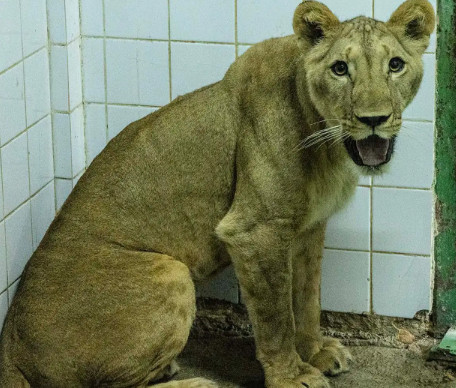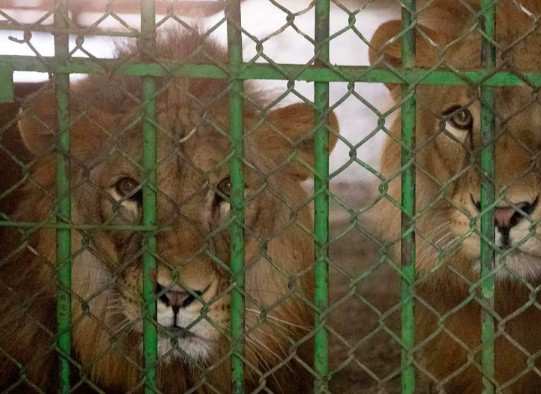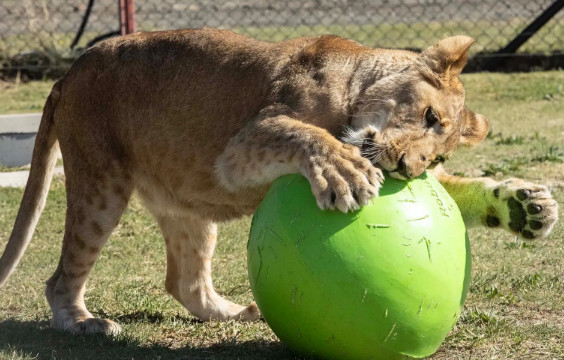
🦁 Rescued Lions Find Sanctuary After Being Abandoned on Streets
When a group of pet lions grew too large to manage, their owners abandoned them on the streets and in the surrounding desert of Kuwait. This dire situation caught the attention of the Kuwait Zoo staff, who immediately took action to rescue these majestic creatures. Upon securing the lions, Animal Defenders International (ADI) formulated a comprehensive plan to ensure their safety and well-being.
🌍 The Crisis in Kuwait
🚨 The Initial Rescue
The lions, once kept as exotic pets, were left to fend for themselves when they became unmanageable. This alarming situation quickly mobilized the Kuwait Zoo staff, who rescued the lions from the streets and the desert, providing them with immediate care and shelter. The plight of these lions highlights the critical issue of keeping wild animals as pets.
🆘 A Call for Action
Jan Creamer, president of ADI, emphasized the severity of the situation, stating, “Lions should never be kept as pets; they are wild animals.” This sentiment underscores the inherent dangers and ethical concerns associated with keeping wild animals in domestic environments.
🌟 The Path to Sanctuary
🏡 Finding a New Home
The rescued lions, affectionately known as the “Kuwait 6,” were offered a new lease on life at the 455-acre ADI Wildlife Sanctuary in South Africa. ADI swiftly began coordinating the complex logistics required to transport the lions to their new home, enlisting the help of Qatar Airways Cargo to secure their safe passage.
✈️ The Journey to South Africa
Transporting large animals like lions is no small feat. Mark Drusch, chief cargo officer at Qatar Airways Cargo, expressed pride in their role, stating, “It takes a lot of effort and logistics for our team to organize moving such large animals, but it is something we are all collectively very proud and passionate to be a part of.”
Throughout the flight, the lions were closely monitored by a veterinarian and cared for by ADI staff, ensuring their health and safety. This meticulous care continued until the lions arrived at their new sanctuary.
🦁 A New Beginning at ADI Wildlife Sanctuary
🏞️ Settling In
Upon arrival in South Africa, the lions—Muheeb, Saham, Shujaa, Saif, Dhubiya, and Aziza—were initially placed in quarantine enclosures. Despite the confinement, their expressions conveyed a sense of relief and anticipation for the better life that awaited them.
🐾 Enjoying Their Freedom
Now free to bask in the sun and engage in playful activities with catnip punch bags and giant balls, these lions are experiencing a joy they had never known. Their ability to roam and play freely marks a significant transformation from their previous lives of captivity.
Jan Creamer described this transformation as “magical,” adding, “Seeing these lions playing as they start their new lives at the ADI Wildlife Sanctuary is magical, and we are excited to see them start to explore their large habitats.”
🔍 The Broader Implications
⚖️ Addressing the Root Cause
The rescue of the Kuwait 6 underscores the broader issue of wildlife trafficking and the pet trade. ADI is committed not only to providing sanctuary for rescued animals but also to combating the illegal trade and preventing other animals from suffering similar fates.
Creamer highlighted this mission, stating, “It is also a reminder of how much work needs to be done to stop the suffering of others like them and to defeat the wildlife traffickers.”
🌍 A Message of Hope and Caution
The story of the Kuwait 6 serves as both a beacon of hope and a cautionary tale. While these lions have been given a second chance at life, their ordeal is a stark reminder of the cruelty and irresponsibility inherent in the exotic pet trade. Creamer’s concluding thoughts echo this duality: “This is great news for these lions but also a warning about a cruel and irresponsible trade.”
🛡️ ADI’s Commitment to Animal Welfare
🌱 Providing a Forever Home
ADI’s dedication to animal welfare is evident in their comprehensive care for the Kuwait 6. The organization’s supporters play a crucial role in funding these rescues, ensuring that the animals receive the best possible care and a chance to live as close to their natural lives as possible.
Creamer expressed gratitude for this support, stating, “The Kuwait 6 lions have their whole lives ahead of them and will have acres of space at the ADI Wildlife Sanctuary. The ADI supporters who are helping to fund their care and this rescue are giving these lions their lives back, living as close as possible to the life they lost.”
🚫 Advocacy and Education
Beyond providing sanctuary, ADI is actively engaged in advocacy and education efforts to raise awareness about the dangers and ethical issues of keeping wild animals as pets. By highlighting stories like that of the Kuwait 6, ADI aims to inspire action and policy changes that will protect wildlife from exploitation and abuse.
📅 Conclusion
The rescue and relocation of the Kuwait 6 lions illustrate the profound impact of dedicated animal welfare efforts. Thanks to the tireless work of organizations like ADI and the support of compassionate individuals, these lions now have the opportunity to live out their lives in peace and safety. Their story serves as a powerful reminder of the importance of protecting wildlife and ensuring that all animals can live free from suffering and exploitation.




















